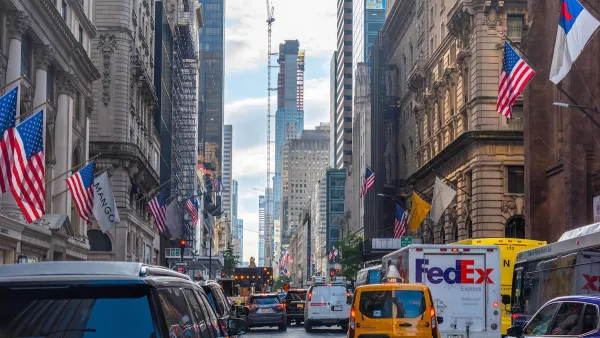For many drivers, the only experience more aggravating than being stuck in traffic is not being able to figure out why there's a jam in the first place. An explanation of the phenomenon called "Traffic Waves" may help ease the aggravation.
What's the likely cause for congestion during your commute? Collision? Construction? Guess again. Most congestion is caused by traffic waves, "a phenomenon that’s been exasperating drivers since the first cars started coming off Ford’s assembly line a century ago," writes Matthew Green.
"The simplest explanation for why traffic waves happen is that drivers have relatively slow reaction times: if the car in front of you suddenly slows down, it’ll likely take you a second or so to hit the brakes. The slower your reaction time, the harder you have to brake to compensate and keep a safe distance. The same goes for the car behind you, which has to brake even harder than you did in order to slow down faster. And so on down the road, in a domino-like effect," he explains.
To see this effect in action, play with the interactive visualization created by programmer Lewis Lehe, a civil engineering graduate student at UC Berkeley.
FULL STORY: What Are Traffic Waves and Why Do They Happen So Much?

Maui's Vacation Rental Debate Turns Ugly
Verbal attacks, misinformation campaigns and fistfights plague a high-stakes debate to convert thousands of vacation rentals into long-term housing.

Planetizen Federal Action Tracker
A weekly monitor of how Trump’s orders and actions are impacting planners and planning in America.

Chicago’s Ghost Rails
Just beneath the surface of the modern city lie the remnants of its expansive early 20th-century streetcar system.

Bend, Oregon Zoning Reforms Prioritize Small-Scale Housing
The city altered its zoning code to allow multi-family housing and eliminated parking mandates citywide.

Amtrak Cutting Jobs, Funding to High-Speed Rail
The agency plans to cut 10 percent of its workforce and has confirmed it will not fund new high-speed rail projects.

LA Denies Basic Services to Unhoused Residents
The city has repeatedly failed to respond to requests for trash pickup at encampment sites, and eliminated a program that provided mobile showers and toilets.
Urban Design for Planners 1: Software Tools
This six-course series explores essential urban design concepts using open source software and equips planners with the tools they need to participate fully in the urban design process.
Planning for Universal Design
Learn the tools for implementing Universal Design in planning regulations.
planning NEXT
Appalachian Highlands Housing Partners
Mpact (founded as Rail~Volution)
City of Camden Redevelopment Agency
City of Astoria
City of Portland
City of Laramie





























